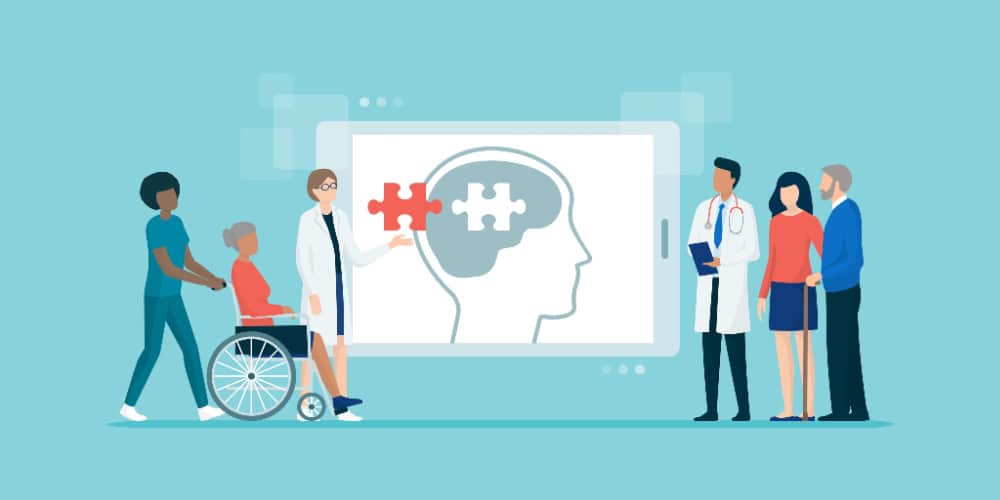
Mental Health: What Is It and How to Be Mentally Healthy
What is mental health?
We all want to be healthy and enjoy a general well-being, but this is impossible if we are not mentally healthy. What are the main characteristics of mental health?
What are mentally healthy people like?
What are the causes of poor mental health and its consequences?
How are mental disorders prevented? How to detect and treat them?
In this article, we will dismantle the false myths about mental health and its prejudices. In addition, we will give you tips to improve your psychological well-being and that of your loved ones.
What is Mental Health Definition

According to WHO, it is a “state of complete mental, physical and social well-being, and not only the absence of disease.” This is the main definition that is often mentioned when discussing this topic. It is brief, very explanatory and reminds us that to be healthy we have to contemplate a large number of variables.
Generally, when we talk about health we think of colds, headaches or other more or less serious physical problems. However, mental health is imperative for us to find ourselves really well. Without it, it does not matter how great the results of our blood tests are.
It is impossible to separate our psychic state from our body. Both maintain a bi-directional relationship. Mental health is studied by multiple professions and different models. There is more awareness now on seeing health as a whole in order to boost our personal development. One in four people will develop at least one mental disorder throughout their life. We need not be alarmed. But if we want to live well, we must learn about health, both physical and mental. That way we can gain knowledge and basic habits to maintain it. In this article, we will give you some guidelines so that you can be mentally healthy and take care of your loved ones.
Key Features that Define Mental Health
- Mental health affects us: It enables us to interact appropriately with the people around us, to establish healthy emotional bonds, to have an adequate work performance, to be able to carry out daily activities or actions as simple as winking one eye.
- It allows us to develop our maximum potential: Being mentally healthy is not limited to living without many mishaps. It motivates us to achieve our goals, to develop our faculties and to face our adversities with vitality.
- It consists of being able to reach happiness: The summit of well-being is happiness as Maslow established. If we are well, we will be able to harmonize our priorities, be part of a group or value the good things in our lives.
- It is a dynamic process: Throughout our life, we are going through several different circumstances. Our mind is adapting to them. We may be more concerned about our normal physical activity in our teens, but now we are satisfied ourselves. Society expectations, the context or our idea of “happiness” change, always looking to improve mental health.
- What we mean by mental health is partly cultural: who defines what is “normal”? It is mainly cultural.
- There are certain parameters to evaluate mental health: Despite the discrepancies that may arise, it is possible to set certain guidelines that allow us to estimate mental health and improve our quality of life. For example, a person who has serious work problems or job stress due to an addictive substance needs to increase their mental, physical and social well-being.
Characteristics of mentally healthy people
Mental health is not a question of all or nothing. It is a continuum with infinite possibilities.
For example, we may be going through a bad run and this does not mean that we have a depression. Mentally healthy people don’t follow the same life model, but do share certain similarities:
- They look at themselves realistically: They know themselves, don’t belittle themselves and don’t over-worship.
- They appreciate what they have: They enjoy the good side of things regardless of their circumstances. They accept and don’t forget to love or value themselves.
- Their social relationships are satisfying: We don’t need to get along with everyone. But we all know or can imagine the discomfort that comes with being isolated or not feeling accepted. Mentally healthy people have effective communication skills with people. They are emotionally intelligent and maintain pleasant relationships with their relatives.
- They know how to disconnect from work and have fun: Lack of rest not only exhausts us physically but also affects our mental state by impairing both our cognitive abilities and our perception of reality.
- They do not boycott themselves: Sometimes the problem is not in the environment. Sometimes we get in the way without realizing it. Mentally healthy people can become self-critical and act accordingly, but they never stop their own progress.
- They behave well with others: We have a strong impulse that pushes us to seek others company. We wish to live harmoniously in society. Mentally healthy people maintain strong bonds with others, cherish them and wish the best for them.
Causes of poor mental health

Risk factors that determine poor mental health in people are multiple and heterogeneous. In fact, the complex diversity of mental problems makes it difficult to find its roots. Each of them has its own causes and peculiarities.
Some seem mainly caused by brain damage or genetic predisposition, some are tremendously influenced by the sociocultural context or cognitive processes, in others are bad associations between stimuli that the affected person learned during child development, etc.
In this field, innovations and continuous theories are developed which allow us to progress. From the combination of different models are emerging interesting explanations that guide the prevention of mental disorders and how to intervene. Although there is some uncertainty, we can name the main risk factors, which are a mixture of environmental, social, family, economic and individual elements.
- Family problems: If a child’s parents have suffered or are mentally ill, have been abused or the family is a hostile environment, the chances that the child’s mental well-being deteriorates will increase exponentially.
- Isolation: Pleasant social life is a powerful defense against poor mental health. Conditions of discrimination, such as bullying, can trigger serious problems such as eating disorders, depression or anxiety symptoms.
- Job stress: We don’t stop hearing in the media about its devastating effects. Still, there are plenty of people who can’t think of another alternative. Unemployment and job insecurity are other factors with great weight in poor mental health.
- Low social and economic status: Adverse socioeconomic conditions make it difficult to handle or react to a mental problem. For example, malnutrition has serious effects on both the physical and emotional levels.
- Difficulty adapting to new situations: The feeling of being disconnected from your surroundings is unpleasant for everyone. For example, for those who are not born in the tech age, ignorance of technology can pose a serious obstacle.
- Addiction: We have all heard about the consequences of drugs and the consequences of alcohol to the brain. Mental health is one of the first affected.
- War: This situation increases discrimination, tension, injustice which can destroy people’s mental health.
Not all people exposed to these circumstances will develop a mental disorder. Not all people adapted to their environment are mentally healthy. Even so, it is important to avoid these risk factors and to fight so that nobody increases their vulnerability to being involved in these situations.
Consequences and Effects of Poor Mental Health
Poor mental health has consequences in all aspects of a person’s life. Not all mental problems have the same scope, only some lead to serious disorders. Some difficulties, such as low self-esteem can affect their relationships or academic performance but can be managed in a short amount of time. However, if this lack of well-being is intensified, it can transcend physical, material, family or work problems. Poor mental health has adverse psychological and economic effects for the affected person and increases their risk of physical illness. Likewise, these problems usually involve a large part of the circle of acquaintances of the injured party. We live in an interconnected society and sometimes, those close to the individual with poor psychological well-being take the worst part.
Poor mental health has adverse psychological and economic effects for the affected person and increases their risk of physical illness. Likewise, these problems can affect the person’s close family and friends, who are witnesses to the changes a mental illness can cause.
Prevention of Mental Disorders- How to Promote Good Mental Health?
There is a great lack of knowledge in society about the meaning of mental health and the habits necessary to maintain and improve it. The first thing to do is to make people aware that anyone can have a mental disorder throughout their life and that it is not the end of the world.
The media sometimes promotes detrimental stereotypes that raise the risk of discrimination. Reality is much more extensive than the predominant clichés about mental disorders. However, they have the key to help the population understand and convey the urgency of maintaining mentally healthy habits.
Politics is one of the keys to developing measures that integrate people with any type of mental problem. As citizens, permanently connected and with the freedom to express our opinion, we have the power to demand more attention to a subject as urgent as this one.
We can also act on an individual level and try to convince our acquaintances, friends, and relatives of the importance of adopting healthy habits and measures, either verbally or through social networks. If we wish to inform ourselves more, there are public organisms like the WHO that provide prevention reports and an abundant bibliography on this subject. Keep in mind that your sources should be scientific and well-based.
How to Detect and Treat a Mental Health Problem?

Mental health problems can affect us throughout the life cycle. Lack of sleep, self-control problems, phobias, developmental disorders, abrupt mood swings and other circumstances can cause us an intense discomfort.
If you are worried about yourself or observe unusual behaviors in your close friends, you notice a surprising decrease in performance, they speak about how bad they are feeling, mention crazy ideas, inconsistent or extremely negative, there may be a deterioration in mental health.
First of all, it is best that you stay calm. It is easier said than done, but remember that mental health is malleable, not all problems are serious. There are quite heterogeneous criteria to establish a diagnosis in these cases and is often complicated. However, the best people for this process are professionals. If we look for information in unreliable sites, such as some web sites, we may make hasty conclusions and make the situation worse.
As for the treatment, it depends considerably on the problem. There are various community services, specialized centers, and professionals suitable for every occasion. In some situations, you can learn useful strategies, change habits, go to therapy, etc. Other disorders require psychotropic drugs (only if the psychiatrist says so). Likewise, you can choose a combination of several solutions. Each case is unique and unrepeatable.
Mental health: Prejudices and false myths
A prejudice is an attitude (generally negative) towards a certain collective, person or object based on a generalization that occurs in a particular social context. People with mental problems have to face various social barriers generated by misinformation and lack of empathy from other people.
A stigma is formed which negatively impacts their recovery because it increases misunderstandings and shame. Likewise, they may lead to denial or aggravation of their symptoms. It is necessary to dismantle several erroneous beliefs.
- Mental problems are due to poor decisions: There are people who use moral causes (laziness, lack of willpower, etc.) to explain the origin of mental disorders and other forms of psychological distress. This is an absolutely false conviction.
- Mental problems are unchangeable: It is true that there are diseases, such as dementias, that don’t have a cure. But there are other circumstances such as eating disorders, drug addiction or generalized stress disorders that can greatly improve. There are more and more effective therapies and remedies.
- People with mental problems are dangerous: In fact, it is estimated that only 3% of people with a mental disorder act violently. Their situation produces more fear, despair or bewilderment than aggressiveness.
- Work diversity is a utopia: Psychological distress does not have to affect all dimensions of the individual. They can be as competent and efficient as anyone.
Helpful tips to improve your mental health and that of your loved ones
1. Remember that you can influence your mental health
We ourselves are capable of maintaining positive thinking, accepting ourselves and loving ourselves. Do not forget to communicate to your friends how important they are to you. With actions as simple as verbalizing your emotions and commenting on the importance of doing so, you can promote healthy actions.
2. Take care of your social relationships
The company of our loved ones is beneficial in all areas of your life. It allows us to adapt better to the environment, provides us with more support and makes us happier.

3. Know yourself
We must be realistic and develop our intrapersonal intelligence. To delve into what goes on in our mind, knowing our limits or exploring our feelings are good ways to notice any defect or problem in us and seek a solution. In this way, we will also learn to understand others better.
4. Try not to worry so much
Total indifference is not good, but neither should we become hypochondriacs. If you lead a healthy life; eating well, not overworking, doing physical exercise, getting enough rest, connecting with nature and doing activities that make you happy, you will become healthier. Leave behind the bad habits and relax.
5. If you have any problems, go to a professional
If something is not right, do not be afraid or ashamed. Look for an experienced professional (psychologist, psychiatrist, therapist, etc.). that can help you through the process.
Even famous people have mental health problems, see the video to find out how famous stars have dealt with these issues.
Thank you very much for reading this article. Finally, it should be noted that volunteering in mental health is very beneficial for people suffering from a disorder and is also really rewarding for volunteers. Prevention and treatment are essential for mental health. Feel free to comment below.
Depression – Lets Fight Back!

Depression is a mental illness that can cause long periods of sadness, emptiness, and hopelessness. It can also lead to physical problems such as headaches, chest pain, and stomach problems. It can even lead to suicidal thoughts and behaviors. Depression is treatable, but it requires support from family and friends, medical professionals, and educators.
The most effective treatment for depression involves a combination of psychological therapy and medications known as antidepressants (SSRI). Psychological therapy helps people identify and work through negative feelings that may be causing their depression. It also provides encouragement and support to help them develop healthier ways of thinking about themselves, their lives, and the world around them. Antidepressant medications can help reduce the symptoms of depression by altering the brain chemistry associated with it.
In addition to professional help, there are things individuals can do on their own to cope with depression. Exercise regularly; physical activity releases feel-good hormones and helps boost self-esteem. Eat a healthy diet; poor nutrition can worsen symptoms and lead to further depression. Get plenty of rest; try to maintain a regular sleep schedule and avoid big changes in your sleeping pattern. Finally, be sure to reach out for support; talk to friends and family, and seek professional help if needed.
Depression is serious and should not be taken lightly. With the right combination of treatment, support, and self-care, people with depression can learn how to manage their illness and live productive lives. If you or someone you know is battling depression, don’t hesitate to reach out for help today – it could save a life.
Bipolar Disorder
is a mental illness that causes extreme mood swings.

A person with bipolar disorder may experience periods of intense happiness and energy (mania) followed by periods of deep sadness and hopelessness (depression).
Bipolar disorder can be a very serious condition that requires treatment. Some people with bipolar disorder may need to take medication to control their mood swings.
Bipolar disorder is a mental illness that is characterized by extreme mood swings. A person with bipolar disorder may experience periods of intense happiness and energy (mania) followed by periods of deep sadness and hopelessness (depression). Bipolar disorder can be a very serious condition that requires treatment. Some people with bipolar disorder may need to take medication to control their mood swings.
There are several ways to identify bipolar disorder. One way is to look for symptoms of mania and depression. Symptoms of mania may include intense happiness, energy, and irritability, while symptoms of depression may include deep sadness, hopelessness, and a lack of energy.
Another way to identify bipolar disorder is by looking at a person’s family history. Bipolar disorder often runs in families.
If you think you or someone you know may have bipolar disorder, it is important to see a doctor for diagnosis and treatment. Treatment for bipolar disorder may include medication, therapy, or both.
Bipolar disorder is a serious mental illness that can cause significant disruptions in life if left untreated. However, with proper treatment and support, people with bipolar disorder can lead successful lives. If you think you or someone you know may have bipolar disorder, it is important to seek help right away. With the right treatment and support, recovery is possible.
People who are living with bipolar disorder should remember that they are not alone – there are many resources available to help them cope with their condition and be successful in life. They should talk to their doctor about the treatments available to them and make sure to keep up with their medication. They should also take advantage of support groups and other resources that can help them manage their condition, such as therapy and lifestyle changes. With the right treatment and support, people with bipolar disorder can lead successful lives.
Bipolar recovery is possible
It is important to remember that recovery from this disorder is possible. With the right treatment and support, people can learn to manage their symptoms and lead a fulfilling life.
It is important for family members to be supportive of their loved ones who are living with bipolar disorder. Family members should educate themselves about the condition so they can better understand what their loved one may be going through. They should offer emotional support by listening to their loved one’s feelings without judging or criticizing them. Finally, they should encourage their loved one to seek help if needed. With the right support and treatment, recovery is possible.
Living with bipolar disorder can be a challenging experience, but it doesn’t have to be impossible. With the right treatment and support, people with bipolar disorder can lead successful lives and manage their condition effectively. If you or someone you know is living with bipolar disorder, remember that help is available – reach out for assistance today.
CogniFit does not provide any medical information, suggestions, or statements. This is an opinion piece generated for content only, always consult with your doctor.














